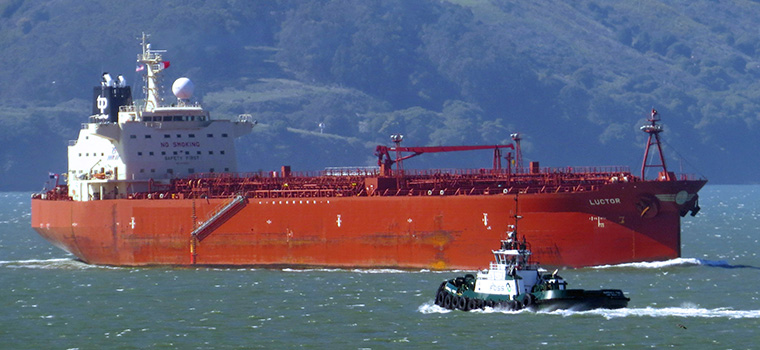The oil company Phillips 66 wants to increase the number of tanker ships carrying crude oil across San Francisco Bay to its refinery-rom 59 to 135 tankers per year.

More oil tankers on San Francisco Bay’s waters would raise the risk of oil spills that can contaminate beaches and kill wildlife. Photo by rulenumberone2, Flickr/CC
BY SEJAL CHOKSI-CHUGH
Published: October, 2017
The oil company Phillips 66 wants to increase the number of tanker ships carrying crude oil across San Francisco Bay to its refinery—from 59 to 135 tankers per year.
More than doubling the number of oil tankers would increase the risk of oil spills in the Bay. Oil spilled in the water can kill birds and other wildlife, make the Bay unsafe for recreation and contaminate local beaches.
Plus, the company’s proposal raises other concerns. The increased tanker traffic would likely carry dirty, heavy tar sands oil. This type of oil is difficult, if not impossible, to remove after a spill.
In 2010, when tar sands oil spilled into Michigan’s Kalamazoo River, response crews were unable to remove the oil from the riverbed completely, even after five years of expensive cleanup efforts. If tar sands oil spilled in San Francisco Bay, it could harm wildlife in the water nearby and smother bottom-dwelling creatures that are critical to the Bay’s food chain.
The Phillips 66 refinery, located in Rodeo on the Bay shoreline, already has a poor track record of oil spills. In September 2016, oil was spilled there during the unloading of a tanker ship, causing large oil slicks in northern San Francisco Bay. Over 100 residents near the refinery sought treatment at hospital emergency rooms for exposure to fumes that were later linked to the oil spill.
And then again, in September of this year, a small spill at the Phillips 66 refinery wharf put a 20-by-20 foot oil sheen onto the Bay’s water. The impacts of small spills like this can accumulate and harm the overall health and resilience of the Bay and its wildlife.
In communities near the refinery, public opposition to Phillips’ expansion proposal is building. Baykeeper is working alongside community and environmental organizations to oppose any increase of oil tankers on San Francisco Bay. Over 24,000 Bay Area residents responded to our action alerts and told responsible agencies to reject the proposal.
A similar coalition effort succeeded in stopping two previous proposals for expansion of Bay Area oil refining. Along with partner organizations and many concerned community members, Baykeeper stopped Valero Energy Corporation’s attempt to expand its rail yard and bring more oil by train to its Benicia refinery. That proposal would have led to a risk of oil spills and possible accidents along the Bay shoreline and in communities near railroad tracks. Our coalition also stopped a planned crude oil storage facility that was proposed by the energy infrastructure corporation WesPac for Pittsburg.
We hope these past successes indicate that community efforts in Rodeo will also have a good chance of stopping Phillips 66’s proposed increase in oil tankers.
Whether we live close to or far from a refinery, every Bay Area resident has a stake in the number of tankers carrying crude oil that cross the Bay. Our communities and many local businesses rely on a healthy Bay. And for wildlife that depends on the Bay, it’s a matter of life and death. By saying no to the risk of more oil spills on San Francisco Bay, we can make sure this place we call home is protected for future generations. To learn more about Baykeeper’s work to keep San Francisco Bay healthy, visit us at baykeeper.org.
Sejal Choksi-Chugh is the executive director of San Francisco Baykeeper. Baykeeper uses on-the-water patrols of San Francisco Bay, science, advocacy and the courts to stop Bay pollution. To report pollution, call Baykeeper’s hotline at 1-800-KEEP-BAY (1-800-533-7229), e-mail hotline@baykeeper.org, or click “Report Pollution” at baykeeper.org.

